Please fill out the following information, and RRFC Admissions will contact you to discuss our program offerings:
Issue #231
by Liya Swift
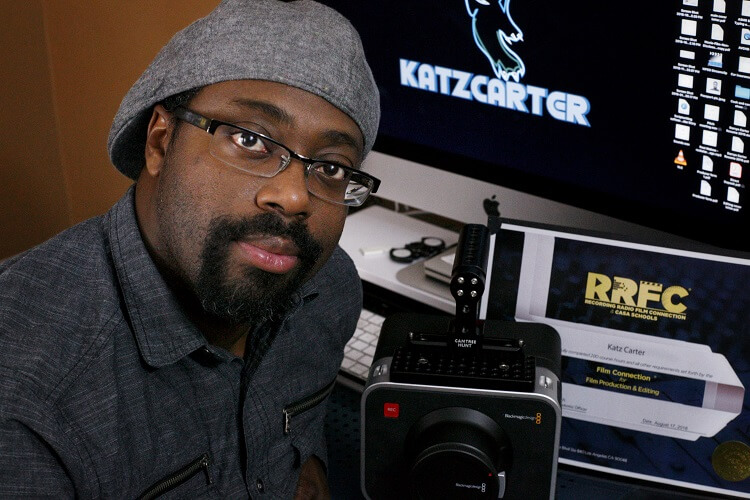
Katz Carter (Los Angeles, CA), graduate of Film Connection for Film Production & Editing is working hard to make his goals a surefire reality. To pay the bills, he’s taking catering jobs as well as shooting and editing wedding videos. Nevertheless, he’s seeing that once somewhat abstract goal of making his movie “the right way” move into focus, one step at a time. Katz has secured a producer for his feature film Full Method. He’s got his own production company off the ground. And along the way, he’s even got some stellar filmmaking advice from none other than Spike Lee!
You recently started your own production company. What can you tell us about the process?
“Yeah. I’ve always said, Katz Carter Productions, Katz Carter Productions…I figured if I’m going to produce a movie myself, I want my name out there. That was the driving force for me to actually get a production company [started], because basically it’s marketing my name. So I called up my friend, who’s a lawyer, she just passed the Bar, and I asked her what it takes to get a business license. And then, I was talking to a member of SAG and a few other people, and they’re like, ‘Oh, you need an entertainment business license,’ which is completely different. So that was a learning curve, because I did get a business license…So what I have is a FBN number, which basically, my business is recognized as a business. But what I really needed was an EIN number. That’s what the entertainment industry uses for production companies… And one great thing about SAG is they’re willing to help you. If it’s your first time, they will call you and you can ask them a ton of questions. They will walk you through it step by step, and they’re really nice. I’ve not had a bad experience.”
What can you tell us about your experience learning with Film Connection mentors Bayou Bennett and Daniel Lir of Dream Team Directors?
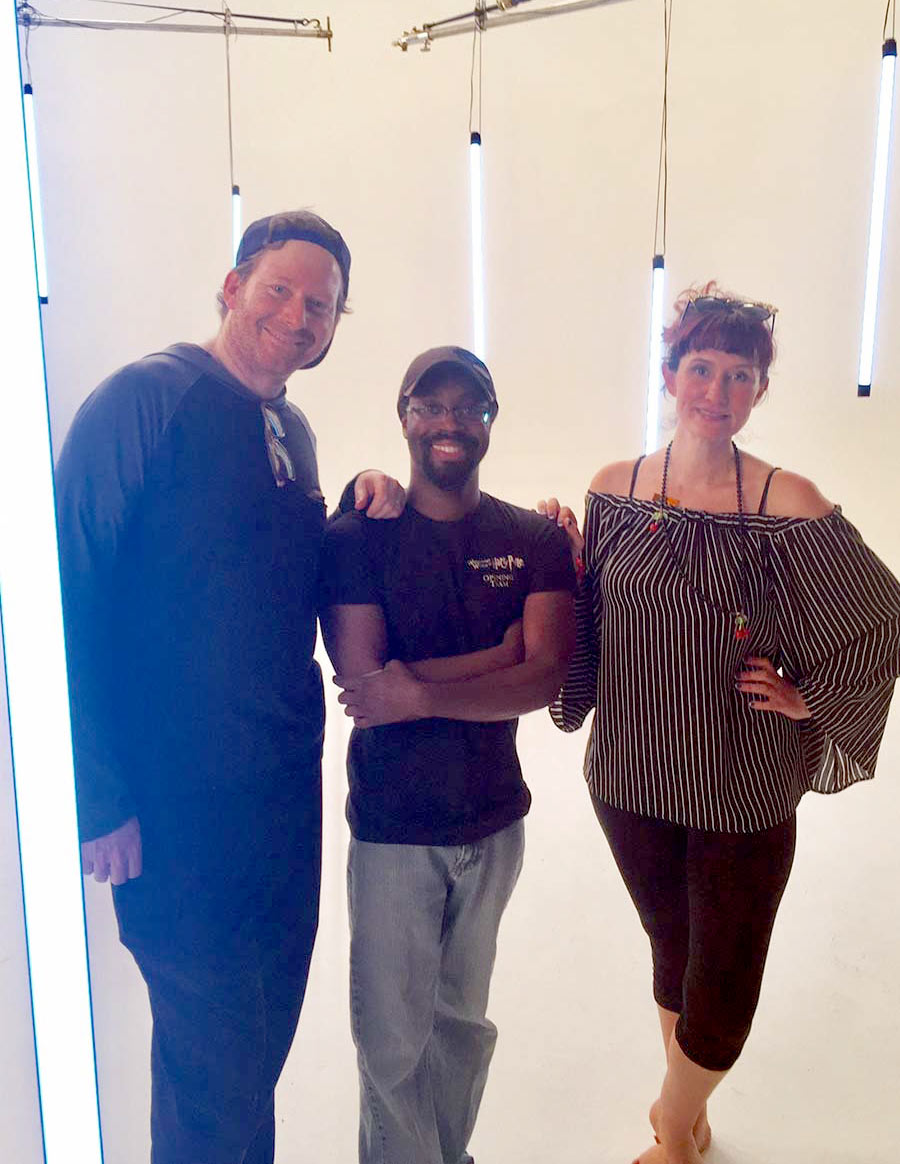
Daniel Lir, Katz Carter, and Bayou Bennett
“The Dream Team Directors are amazing mentors…Even now, after graduating, they still answer my phone calls, answer my texts, help me out, and give me advice on a lot of things on the production side. So that’s really wonderful to have.
I understood the basics of directing certain things and certain elements. They helped me out with a lot of editing and lighting, what lenses to use, but most of all—the pitch package. I already had a concept and a script, once I had all of that already set up and in place, they’re like, ‘Okay, well your next step would be to start pitching to producers, not necessarily crowdfunding, but pitching your idea to producers in a professional way so that they understand what your vision is and how your vision’s going to look on screen.’”
As it turns out, that pitch package ended up making its way to Kevin Hart’s stunt double who’s now your producer.
“Yeah, he got hold of my [pitch] package, and he liked the professionalism of it. He was like, ‘I want to help you with this.’ So yeah, that’s how I got a leg up into the film I’m producing now.”
What’s your advice to aspiring filmmakers who want to start their own production companies?
“Each journey’s going to be different. My path’s going to be different from the next person. So wherever you are in life, the path you’re on, stop and ask directions along the way. Don’t go at this alone or don’t go at this thinking, ‘Oh, it can only be done this way.’ No, that’s not the case…Ask somebody probably that’s in SAG. I asked somebody that works for SAG how to do this. Same thing with the payroll, ask somebody that works for payroll, ask them everything. Ask as many questions as you want, as needed, and put all ego aside. Everybody needs help…Listen to the people that are doing it…And also enjoy the ride…Take a step back and enjoy this journey that you’re going on right now. Enjoy this process, because it’s not going to happen again.”
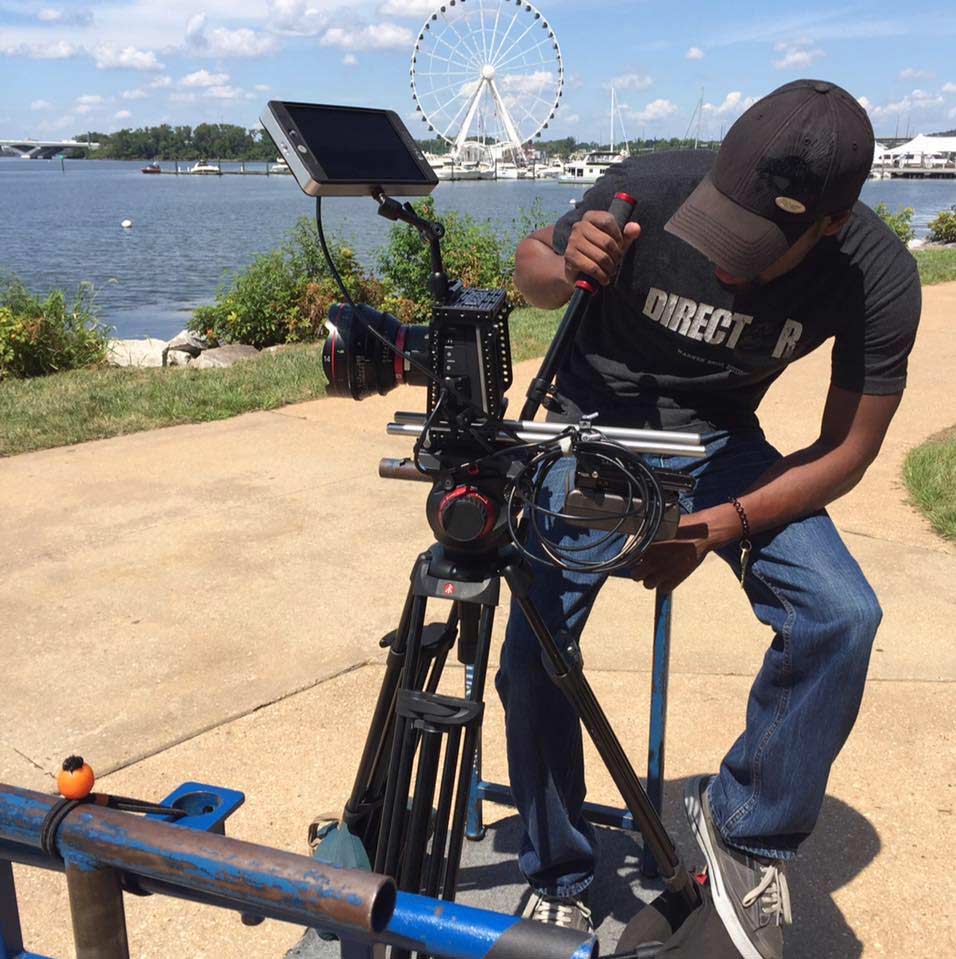
Film Connection grad Katz Carter
So we hear you got to meet Spike Lee. What advice did he give you?
“He gave me the best advice. I asked him, ‘What can someone like me do to get my project in your hands for you to look at?’ And he was like, ‘Do good sh_t. If you do good sh_t, people will watch it and word will get around.’ And I was like, ‘That’s it, huh?’ And he was like, ‘Yeah, that’s all I can tell you.’ So I will take that to heart.”
How can Film Connection students make the most of training with their mentors?
“Your mentors are available to you. I wouldn’t say 24/7, I’m sure they have office hours, but your mentors are open for you. I volunteered a lot with my mentors. Whatever shoot they were on, I was a production assistant, I got them coffee. I was just there volunteering my time…If you have an opportunity to watch your mentor do their thing, take advantage of that. Don’t just wait for a set time like, ‘Oh, I’m going to meet up with my mentor every Monday or every Tuesday.’ It’s like, no, if that person is in the studio, if that person is on-set, and it’s okay for you to be there, do it, take it! Be a sponge.”
View Film Connection’s in-industry programs.
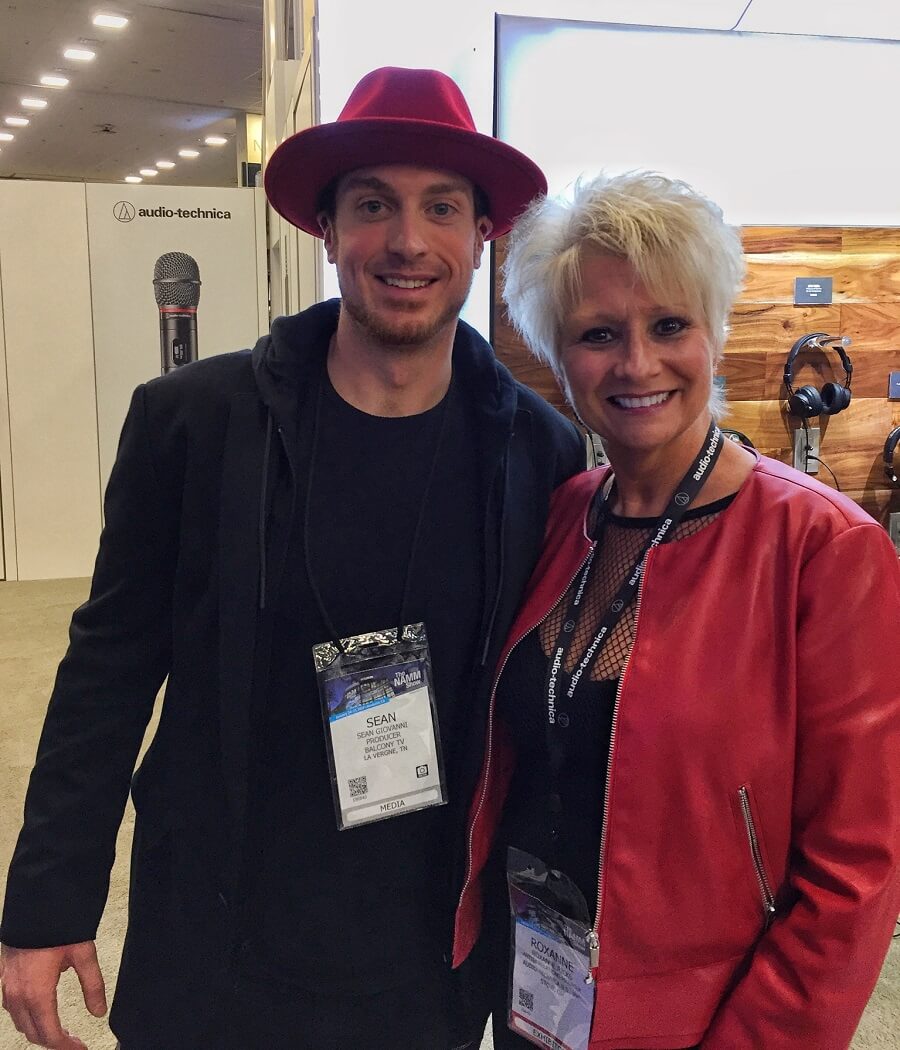
Recording Connection mentor Sean Giovanni aka “Gio” and Roxanne Ricks of Audio-Technica
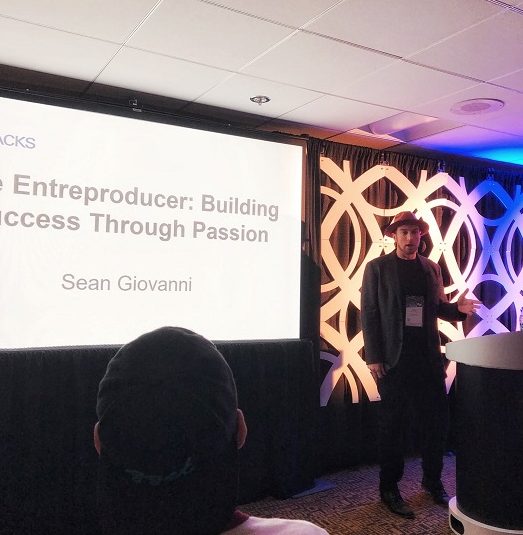
Sean Giovanni speaking at The NAMM Show 2019
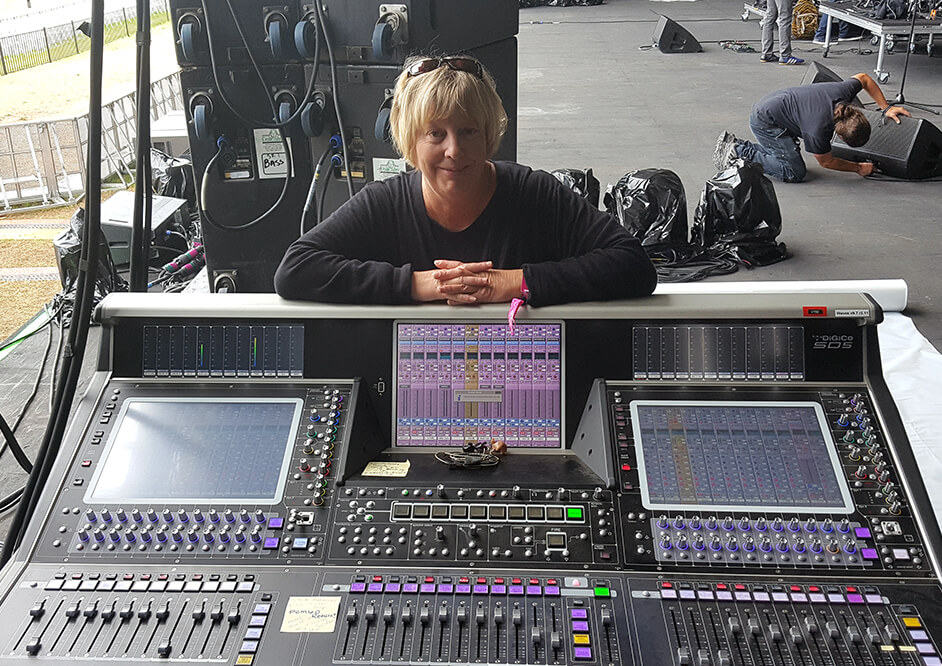
Karrie Keyes, Executive Director & Co-Founder of SoundGirls
 Recent Radio Connection for Radio Broadcasting graduate Lady Rocka Chi, who trained with Victor Akoko of VPS Media, has a zeal for learning and discovery that’s downright infectious. Turns out, that curiosity goes way back:
“This was a cool assignment. I reported the weather in sunny L.A and then in cold Boston…My mentor said I should smile [while] I’m reporting the weather and be friendly like I’m in conversation…
I always wondered how I would do at reporting the weather. As a child, I used to practice playing ‘weather girl’…I thought it was interesting on TV…Then, as I got older and wiser, I realized the actual process. They don’t even have that board in front of them. Must take some getting used to when it’s all green screen!”
Recent Radio Connection for Radio Broadcasting graduate Lady Rocka Chi, who trained with Victor Akoko of VPS Media, has a zeal for learning and discovery that’s downright infectious. Turns out, that curiosity goes way back:
“This was a cool assignment. I reported the weather in sunny L.A and then in cold Boston…My mentor said I should smile [while] I’m reporting the weather and be friendly like I’m in conversation…
I always wondered how I would do at reporting the weather. As a child, I used to practice playing ‘weather girl’…I thought it was interesting on TV…Then, as I got older and wiser, I realized the actual process. They don’t even have that board in front of them. Must take some getting used to when it’s all green screen!”
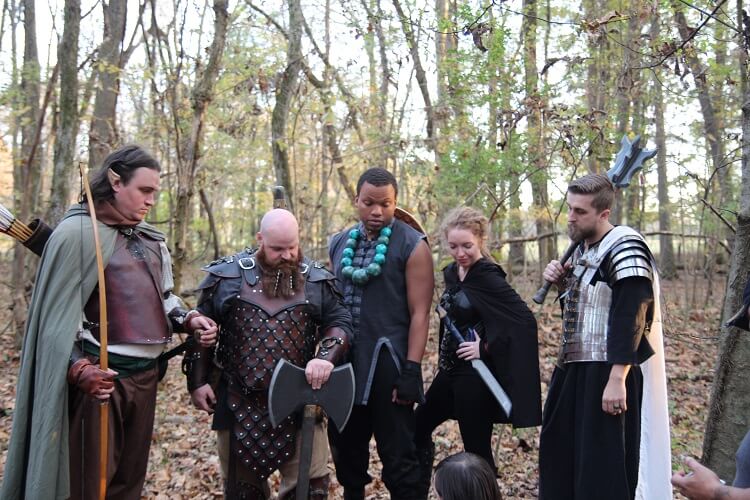 Film Connection for Film Production & Editing student Aaron Weitlauf, who externs with mentor Zac Adams of SkyDive Films, is being trusted to work on professional shoots! In a recent blog post, Aaron talks about how, in just a matter of months, he’s learned valuable skills and become more self-assured:
“My skill level at the start of this program in August was a beginner, a novice at best. I was brand new to a film set. Now, I’m directing my own videos and making promising relationships with clients as a filmmaker…I’ve kept [up] a great relationship with [director] Sergio Vazquez…On the most recent shoot, we were doing combat choreography in relation to fight scenes. Watching a seasoned director work with actors in a combat setting was insightful…I now have the confidence to properly square up two individuals in an intense action scene.”
*Attention RRFC students: Would you like to be in our newsletter? Then, blog about your experiences. Tell us your story!
Film Connection for Film Production & Editing student Aaron Weitlauf, who externs with mentor Zac Adams of SkyDive Films, is being trusted to work on professional shoots! In a recent blog post, Aaron talks about how, in just a matter of months, he’s learned valuable skills and become more self-assured:
“My skill level at the start of this program in August was a beginner, a novice at best. I was brand new to a film set. Now, I’m directing my own videos and making promising relationships with clients as a filmmaker…I’ve kept [up] a great relationship with [director] Sergio Vazquez…On the most recent shoot, we were doing combat choreography in relation to fight scenes. Watching a seasoned director work with actors in a combat setting was insightful…I now have the confidence to properly square up two individuals in an intense action scene.”
*Attention RRFC students: Would you like to be in our newsletter? Then, blog about your experiences. Tell us your story!

RRFC is education upgraded for the 21st century.
Get the latest career advice, insider production tips, and more!
Please fill out the following information, and RRFC Admissions will contact you to discuss our program offerings:
Stay in the Loop: Subscribe for RRFC news & updates!
© 2025 Recording Radio Film Connection & CASA Schools. All Rights Reserved.


